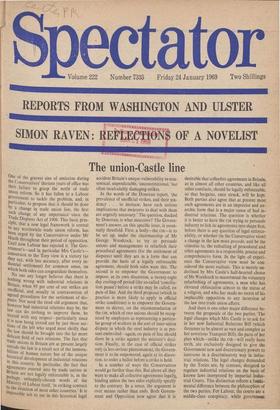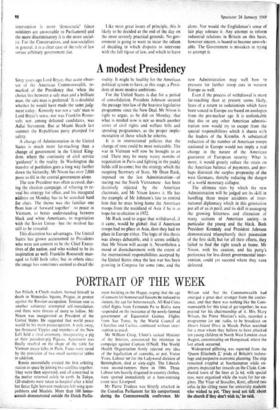The union-Castle line
One of the gravest sins of omission during the Conservatives' thirteen years of office was their failure to grasp the nettle of trade union reform. So it has fallen to a Labour government to tackle the problem, and, in Particular, to propose that it should be done by a change in trade union law, the first such change of any importance -since the Trade Disputes Act of 1906. This basic prin- ciple, that a new legal framework is central to any worthwhile trade union reform, has been urged by the Conservatives under Mr Heath throughout their period of opposition. Until now Labour has rejected it. The Gov- ernment's—and in particular Mrs Castle's_ conversion to the Tory view is a victory (as they say, with less accuracy, after every in- dustrial settlement) for common sense, on which both sides can congratulate themselves. No one any longer believes that there is nothing wrong with industrial relations in Britain, when 95 per cent of our strikes are unofficial, and usually in contravention of agreed procedures for the settlement of dis- putes. Nor need the tired old argument that, however bad industrial relations may be, the law can do nothing to improve them, be treated with any respect—particularly since it is now being trotted out by just those sec- tions of the left who urged most shrilly that the law should be brought into the far more delicate field of race relations. The fact that trade unions in Britain are at present largely outside the law is a result not of the immuta- bilities of human nature but of the unique h. istorical development of industrial relations in this country. In particular, the fact that agreements entered into by trade unions in Britain are not legally enforceable is, in the perhaps unhappily-chosen words of the Ministry of Labour itself, 'in striking contrast to the situation of most other countries.' It is Impossible not to see in this historical legal accident Britain's unique vulnerability to non- sensical, unpredictable, 'unconstitutional,' but often incalculably damaging strikes.
In the words of the Donovan report, 'the prevalence of unofficial strikes, and their ten- dency . . . to increase, have such serious implications that measures to deal with them are urgently necessary.' The question, ducked by Donovan, is what measures? The Govern- ment's answer, on this specific issue, is essen- tially threefold. First, a body—the. CIR—iS to be set up, under the chairmanship of Mr George Woodcock, to try .to persuade unions and managements to refurbish their procedural agreements (for the settlement of disputes) until they are in a form that can provide the basis of a legally enforceable agreement, should both sides want this. The second is to empower the Government to impose, at its own discretion, a twenty-eight day cooling-off period (the so-called 'concilia- tion pause') before a strike may be called, on pain of fine. And the third proposal (which in practice is more likely to apply in official strike conditions) is to empower the Govern- ment to decree, on the recommendation of the cm, which of two unions should be recog- nised by employers as representing a particu- lar group of workers in the sort of inter-union dispute in which the steel industry is at pre- sent embroiled—again, on pain of fine should there be a strike against the minister's deci- sion. Finally, in the case of official strikes only (a less serious phenomenon), the Govern- ment is to be empowered, again at its discre- tion, to order a ballot before a strike is held.
In a number of ways the Conservatives would go further than this. But above all they want to make all collective agreements legally., binding unless the two sides explicitly specify to the contrary. In a sense, the argument is over means rather than ends. Both Govern- ment and Opposition now agree that it is desirable that collective agreements in Britain, as in almost all other countries, and like all other contracts, should be legally enforceable, so that bargains, once struck, will be kept. Both parties also agree that at present most such agreements are in an imprecise and an- archic form that is a major cause of bad in- dustrial relations. The question is whether it is better to have the CIR trying to persuade industry to lick its agreements into shape first, before there is any question of legal enforce- ability, or whether (in the Conservative view) a change in the law must precede, and be the stimulus to, the redrafting of procedural and other agreements in a responsible, precise and comprehensive form. In the light of experi- ence the Conservative view must be con- sidered the more realistic. This is merely un- derlined by Mrs Castle's half-hearted choice of Mr Woodcock to mastermind the voluntary refurbishing of agreements, a man who has elevated obfuscation almost to the status of a religion, and who has made no secret of his implacable opposition to any incursion of the law into trade union affairs.
And there is one other major difference be- tween the proposals of the two parties. The legal changes which Mrs Castle is to ask for in her new Industrial Relations Bill (which threatens to be almost as vast and complex as her notorious Transport Bill), the parts of her plan which—unlike the CIR—will really have teeth, are exclusively designed to give the Government new and discretionary powers to intervene in a discriminatory way in indus- trial relations. The legal changes demanded by the Tories are, by contrast, designed to regulate industrial relations on the basis of known laws interpreted by impartial Indus- trial Courts. This distinction reflects a funda- mental difference between the philosophies of the two parties. For Labour, the courts are a middle-class conspiracy, while government intervention is more 'democratic' (since ministers are answerable to Parliament) and the more discriminatory it is the more social- ist. For the Conservatives, and non-socialists in general, it is a clear case of the rule of law versus arbitrary government fiat. Like most great issues of principle, this is likely to be decided at the end of the day on the most severely practical grounds. No gov- ernment is going to want to incur the odium of deciding in which disputes to intervene with the full rigour of law, and which to leave alone. Nor would the Englishman's sense of fair play tolerate it. Any attempt to reform industrial relations in Britain on this basis, however sincere, is bound to become unwork- able. The Government is mistaken in trying to attempt it.



































